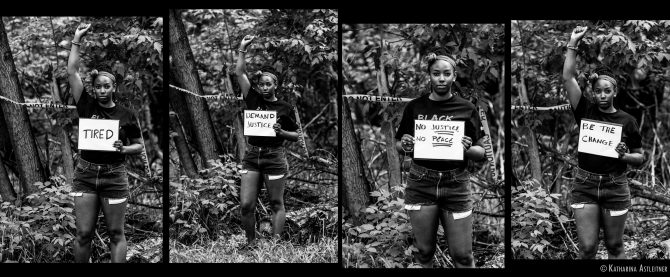Opinions expressed are solely my own and are based on my personal reflection and understanding of others’ personal narratives.
As the racial crisis unfolds, I have found myself unpacking my experiences with racism and my relationship to the anti-racism movement. The range of emotions I have felt as a first generation Black Canadian have been confusing to process and understand. These emotions include excitement, hope, frustration, wariness and exhaustion. Many other members of the Black community feel this way after listening to personal narratives over the past few weeks. Hearing others' experiences with racism has made me more aware of how I’ve internalized my own experiences growing up in Alberta. Reflecting back, I see how I downplayed, brushed off or outright ignored acts of racism and discrimination as a coping mechanism. It was easier to try and get along and not draw attention as a person who knew they looked different and felt they didn’t belong.
Racism in Canada is generational and has inflicted trauma and pain across entire communities. My own experience with racism has been intimate, personal and for the most part private. Over the past few weeks, there has been a shift where public space has opened up for people to discuss racism and learn from one another’s experiences. The discussion of racism, which was once a predominantly private and personal experience for many, now exists in a public space. The support has felt both humbling and overwhelming. More than ever I now find myself needing to protect my own energy and mental health when discussing race and discrimination with others.
Educate.
Supporting the movement requires more action than liking posts and sharing content on social media. Educate yourself on the issues that exist because of systemic forms of oppression.
Contact your elected representatives: School Board Trustees, City Councillors, Provincial MLAs and Federal MPs.
Take your voice to the polls and vote for those whose platforms address anti-racism and promote diversity and inclusion.
Stop and really think of how you can amplify your voice. Amplify your voice in your home life, in your work life, in your social life and within the broader community.
Stop and think how your actions can change to support the Black community.
After processing the momentum of the anti-racism movement here in Canada and the United States, I found myself asking how I could further use my voice to propel the movement forward.
What tools and resources can I promote and provide for those trying to catch up?
While I am not responsible to educate anyone on what racism means and how to become a better ally, I can still support their educational journey.
Literature is one educational resource that facilitates, and may even begin, one’s journey in understanding new perspectives, acknowledging and challenging one’s own biases, and developing new ways of thinking. Education must be completed before meaningful conversations can occur that have the potential to enact sustainable change to tackle racism.
I curated the Let's Talk About Race & Discrimination library list in response to the questions I found myself asking. While I’m here to support your educational journey, it doesn’t mean that all Black community members have the capacity or capability to do the same. I hope that the literature I’ve included can answer questions for both those with lived experiences as well as allies of the movement.
- What is racism?
- Where does racism exist?
- How does racism impact the lives of those experiencing it?
- How does racism as an experience differ between Canada and the United States?
Engage.
Let’s Talk About Race & Discrimination is an ongoing work in progress. While I’d love to live in a world that doesn’t have racism, we need to acknowledge that there is a tremendous amount of work to do to impact the systems and people that continue to oppress and kill racialized groups. Let’s Talk About Race & Discrimination includes both books that I’ve read and loved, as well as books that are on my reading ‘to-do’ list. I’ve included pieces meant for children, as well as more academic literature in an effort to engage all learners from this process.We owe it to everyone to change. We owe it to everyone to do better.
Activate.
Everyone has a role to play in this movement. We have the conversation started and let’s continue advocating so that we can make impactful, sustainable change. You don’t have to rely on other people to educate you, you can start by picking up a novel and using it to understand new perspectives, experiences and ways of thinking. For example, I joined the EPL from Home virtual book club: The Ungrateful Immigrant.
I’ve already witnessed people reflecting on how their actions can further support this movement. One individual shared how they contacted an organization regarding the lack of content they had available for their clientele. Another example is a personal friend of mine shared a list of actions they can take to support the movement and combat racism in their personal and work lives. We need both those with lived experiences and allies to unite to survive and dismantle the racialized world we live in.
Be kind to one another.
Stand up for each other.
Educate yourself.
Use your voice.
Take up space.



Add a comment to: Educate. Engage. Activate. To End Racism.